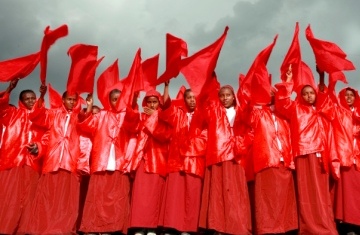
Above: Ethiopians are once again headed into uncertain times
as world watches and awaits for the 2010 elections to unfold.
Reuters Blog
Posted by: Barry Malone
November 3rd, 2009
On the evening of the 20th of March 1878, Ethiopia’s two great rivals, Emperors Yohannes IV and Menelik II, came face-to-face to thrash out their differences.
As the two men met for the first time, traditional Ethiopian singers are said to have sang “A road that is perilous is far / you have to climb and then descend.”
Ethiopia’s journey since then has certainly been perilous.
It has been marked by great heights like the defeat of Italy’s colonialist army at the battle of Adwa in 1895. And devastating lows such as the 1984 famine that killed more than 1 million people and brought the country long-lasting notoriety.
The huge nation is again heading into interesting times.
This week the government of Prime Minister Meles Zenawi agreed a code of conduct for next May’s national elections with three opposition parties — two of which are dismissed by opponents as ruling party satellites.
But the biggest opposition force, a coalition of eight parties called Medrek (the Forum), did not participate in the negotiations despite repeated invitations. Read more.


























Good read. I’m actually writing a research paper right now about “peaceful transition of political power.” I’m very interested to see how the 2010 elections will go. I’m expecting better from our country this time! A more fair,free, and nonviolent election. Maybe too much to ask? LoL.
You are expecting better this time? Is there anything you know that we dont.The political repression is worst than ever before,with the new anti-democratic laws in place it sure is much better for govt and its supporters.
I was imprisoned and tortured during Mengistu. So I have never really been against the current government and I still am not. But I just have this instinct that 2010 would be a water shade moment in Ethiopia. Something will break. I don’t think both the Govt and the opposition even know it, with the exception of few wise men and women in both sides. The eagle (if you know what I mean) believes the government will declare false victory. From there on, however, it will be a quick and dramatic downward spiral for the authorities in charge. Read my lips and remember my words. There will be a domino effect across the country and the authorities will lose control of most of the country very quickly and unexpectedly. Unless something is done in the next few months, from mid 2010 – 2012 will be enormously tough period for all of Ethiopia, as no one will really knows who is truly in charge of different parts of the country. Eritrea, Somalia and others will openly meddle inside Ethiopia. Once things are sorted out though after about two years, with new leadership, Ethiopia will be on the rise again – justice, peace and economic prosperity – will be Ethiopia’s trademark for the next 100 or so years before trouble returns. If I was to advise Meles, I would sincerely tell him to plan his peaceful exit now. Take your wife and child somewhere else and live the remaining time of your life with peace as a respected former African statesman who left power willingly. You will be a respected and well paid lecturer and author. After a decade or so, Ethiopians of all stripes will begin to look up to you in admiration, not because of what you have done in the past 20 years, but rather for your courageous act of resigning on time. Don’t make the mistakes of your predecessors like Mengistu and Haile sellassie. Let your party find another leader. Insisting to hang on to power at this moment is not worth it and it is not very wise. You will be doing the biggest favor for your party, your country and your family – much bigger than you can ever imagine. However, once you pass the 2010 mark though, it will be too late as you would have entered the imminent point of no return from unceremonious removal. History teaches us that no one is indispensable. Even Haile Selassie was removed. In politics, timing is always important and it is time for rational thinking and prayer in the palace in Addis. Nothing is forever and at the end of the day, family is more important.
Bahatawi Shimeles, are you joking? I hope you are because you sound so ridiculous. First of all, are you tenquay? you speak as if you know the future. Second, Meles wanted to resign a long time ago, but his party refused. Third, even if the opposition was to win, why do you think he has to leave his country? That is the number one issue the opposition has to agree and guarantee his safety and his family’s safety (that is if they were elected popularly). To reside in his country is his birth right, even if you despise him. Fourth, it is not that his party can’t find another leader, they just want this specific leader. Fifth, even if he resigned as PM, which is possible, he can still serve his party and his country in all other capacity, including as President, so long as his party chooses. Look at Russia for example. It is a working democracy.
I hope that Bahatawi is wrong for the simple fact that criminals should pay their due where they committed their crime. Zenawi leaving the country and have a peaceful life somewhere in the world is a mockery of justice.The man has committed heinous crime against the country and its people and should receive the appropriate punishment rite where he committed it.